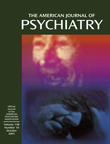Estrogen-Replacement Therapy for Depression
To the Editor: Women are more vulnerable to a depressed mood during the perimenopausal years than during the premenopausal years (1). Estrogen-replacement therapy has been suggested as a potential treatment for a depressed mood during perimenopause (1). Whether to treat a perimenopausal woman who has depression with estrogen alone, an antidepressant alone, or a combination of both of these medications is controversial.
We evaluated 10 treatment-naive perimenopausal women (mean age=48.8 years, SD=2.9; mean education=15.2 years, SD=3.2) who came to the Mood Disorders Clinic at the University of California at Los Angeles (UCLA) for the treatment of major depressive disorder. Perimenopause was defined as irregular menstrual periods or an absence of menstrual periods for less than 1 year, with plasma levels of follicle-stimulating hormone greater than 20 IU/liter. Subjects were excluded if they received hormonal medication or had a medical illness, a history of drug or alcohol abuse, or a psychiatric disorder other than depression.
The diagnosis of major depressive disorder was made on the basis of the Structured Clinical Interview for DSM-IV, Patient Edition. The Hamilton Depression Rating Scale was administered to subjects at baseline and weekly thereafter as the outcome variable for the assessment of the degree of remission from depressive symptoms. A response was defined as a final Hamilton depression scale score of 50% or less of the subject’s baseline level. Remission was defined as a final Hamilton depression scale score of 7 or lower. The subjects’ mean Hamilton depression score at baseline was 18.1 (SD=3.1). All subjects gave written informed consent to participate in an open trial of estrogen-replacement monotherapy for 8 weeks. The UCLA institutional review board approved this study protocol. All patients received 0.3 mg/day of 17β-estradiol without progesterone or an antidepressant for 8 weeks.
Depression had remitted in six of the 10 women by the end of the trial. Three additional subjects met the criteria for response, and one subject had no response to treatment. Degree of remission was not associated with the demographic or clinical characteristics of the patients. No patients reported any adverse effects. Overall, the subjects’ mood had improved after the first week of treatment (t=2.61, df=9, p<0.05). This improvement continued throughout the study (F=10.71, df=8, 112, p<0.001).
This study suggests the efficacy of estrogen-replacement therapy in depressed perimenopausal women (1). Consideration of the use of estrogen-replacement therapy as an alternative to standard antidepressant treatment may be in order if future research demonstrates the clinical efficacy of estrogen in the treatment of depression.
1. Schmidt PJ, Lynette N, Danaceau MA, Tobin MB, Roca CA, Murphy JH, Rubinow DR: Estrogen replacement in perimenopause-related depression: a preliminary report. Am J Obstet Gynecol 2000; 183:414-420Crossref, Medline, Google Scholar



